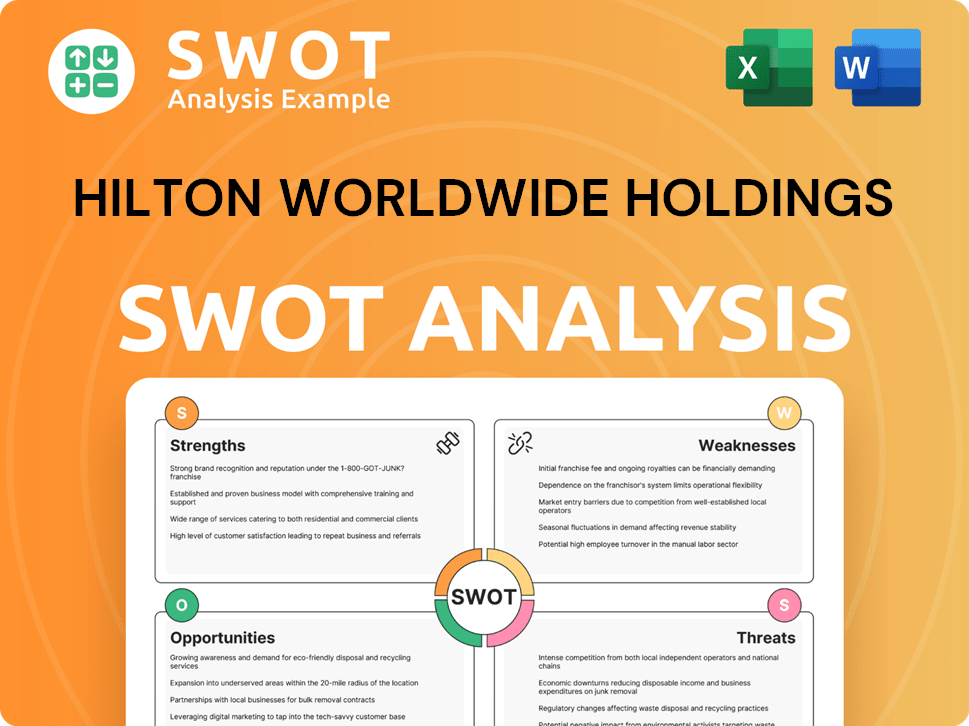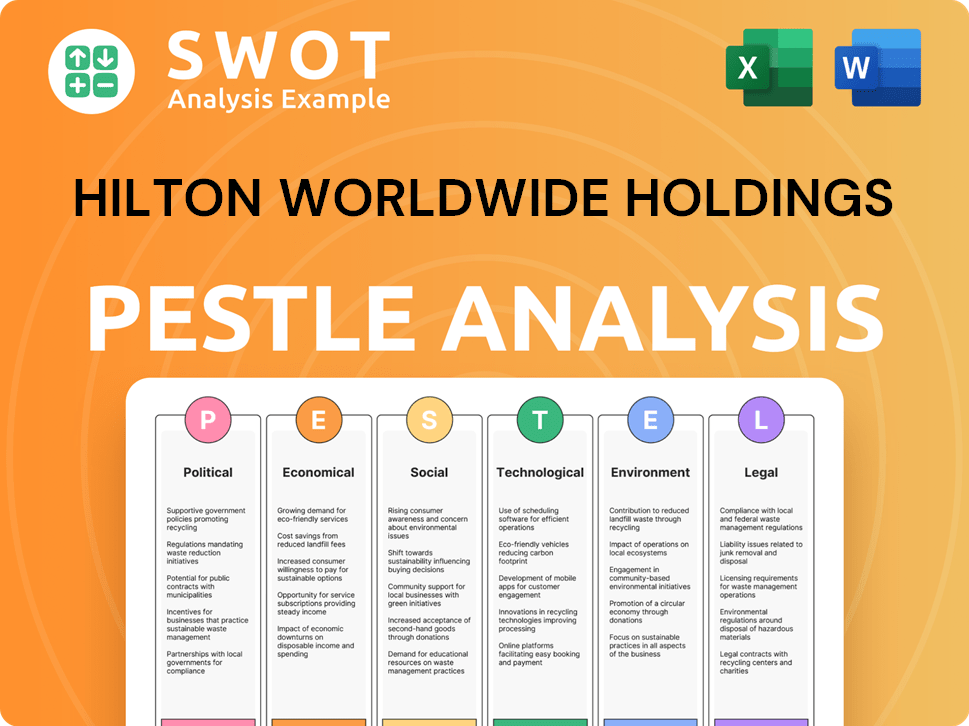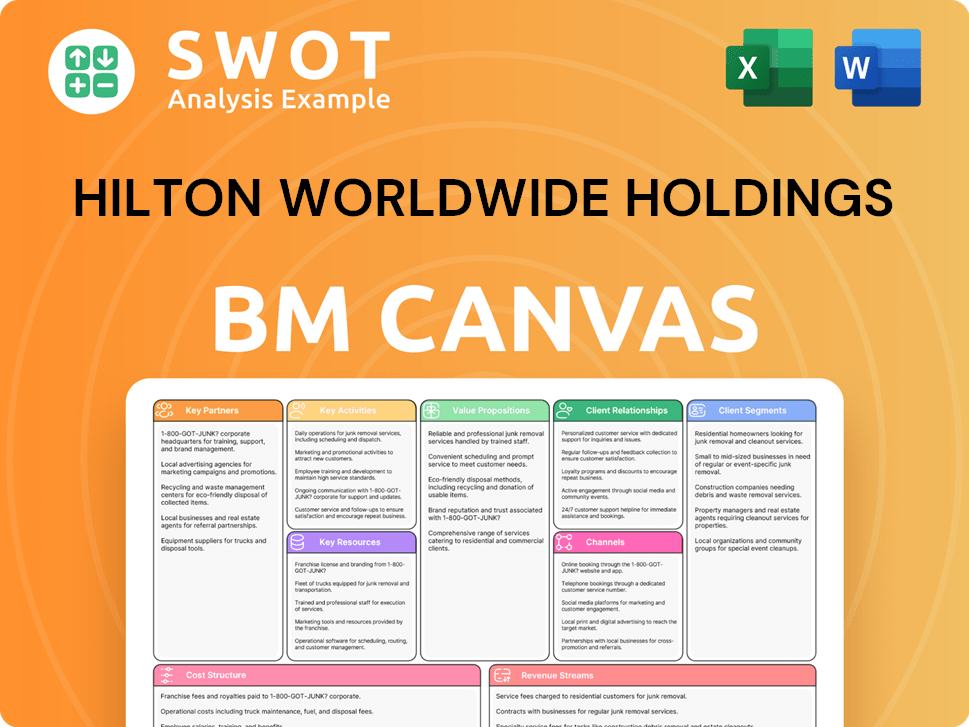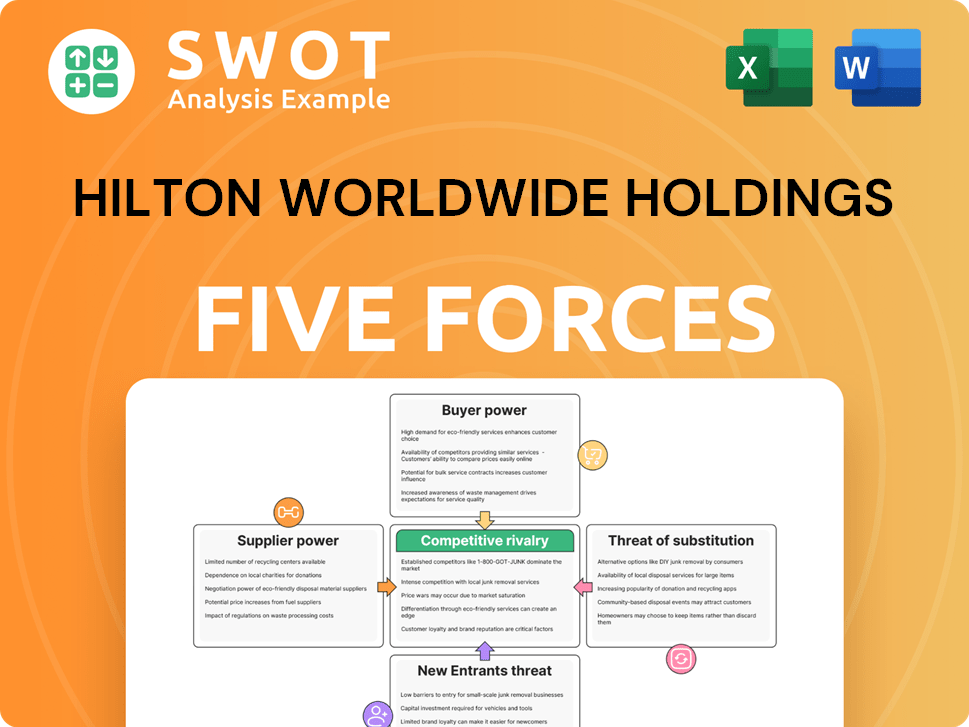Hilton Worldwide Holdings Bundle
How Does Hilton Dominate the Global Hospitality Stage?
The global hospitality industry is a battlefield, and Hilton Worldwide Holdings Inc. is a seasoned general. From its inception in a small Texas town to its current status as a global giant, Hilton's journey is a masterclass in strategic growth. Understanding the Hilton Worldwide Holdings SWOT Analysis reveals the core of its competitive strategy.

This exploration of the Hilton competitive landscape delves into the company's history, its impressive scale, and its strategic positioning within the fiercely competitive hotel industry. We'll analyze Hilton's market share, identify its key competitors, and examine how it leverages its strengths to maintain its competitive advantage. This analysis will provide valuable insights into Hilton's ability to navigate the challenges and opportunities of the hospitality market.
Where Does Hilton Worldwide Holdings’ Stand in the Current Market?
Hilton Worldwide Holdings Inc. holds a strong position within the global hospitality industry. As of December 31, 2024, the company operated 8,447 properties with 1,268,206 rooms across 140 countries and territories. Its diverse brand portfolio caters to various market segments, from luxury to focused-service accommodations, contributing to its extensive reach and market presence.
The company's core operations revolve around managing and franchising hotels under its various brands. Primary revenue streams include management and franchise fees, primarily from the Americas. This business model allows for significant scale and profitability, supported by a robust development pipeline and a focus on geographic expansion to maintain its competitive advantage.
The value proposition of Hilton lies in its ability to offer a wide range of accommodations and experiences to a diverse customer base. Its loyalty program, Hilton Honors, enhances customer retention and drives repeat business. This, combined with a strong brand reputation and operational efficiency, helps the company maintain its competitive edge in the dynamic hotel industry.
Hilton's extensive global footprint includes 8,447 properties as of December 31, 2024. The company's largest brands, Hampton and Hilton, represent a significant portion of its total rooms. This scale allows it to cater to a wide range of customer preferences and market segments, solidifying its position in the hotel industry competition.
Hilton reported total revenue of $11,174 million for the full year 2024, a 9.2% increase from the previous year. Net income for 2024 was $1,539 million, demonstrating strong financial health. These figures reflect a robust recovery in the hospitality sector, driven by both leisure and business travel, which is crucial for the company's competitive advantage.
While the U.S. accounts for 65% of Hilton's system-wide hotel rooms, the company is actively expanding globally. In 2024, Hilton expanded into new markets, bringing its total operating countries and territories to 140. This strategic expansion is key to increasing its market share and mitigating risks associated with regional economic fluctuations.
As of December 31, 2024, Hilton had a robust development pipeline of 3,578 hotels representing 498,600 rooms. Nearly half of these rooms were under construction, with over half located outside the United States. Hilton projects a net unit growth of 6% to 7% in 2025, reflecting its commitment to sustained growth and market penetration.
Hilton's competitive advantages stem from its diverse brand portfolio, global presence, and strong financial performance. The company differentiates itself through its loyalty program, Hilton Honors, and by continuously expanding its global footprint. For more insights, explore the Growth Strategy of Hilton Worldwide Holdings.
- Diverse Brand Portfolio: Catering to various market segments.
- Global Expansion: Strengthening its presence in key markets.
- Strong Financial Performance: Driving growth and profitability.
- Customer Loyalty: Enhancing customer retention through Hilton Honors.
Hilton Worldwide Holdings SWOT Analysis
- Complete SWOT Breakdown
- Fully Customizable
- Editable in Excel & Word
- Professional Formatting
- Investor-Ready Format

Who Are the Main Competitors Challenging Hilton Worldwide Holdings?
The Hilton Worldwide Holdings operates in a highly competitive environment, facing significant challenges from various players in the hotel industry. Understanding the Hilton competitive landscape is crucial for assessing its market position and strategic direction. This analysis involves evaluating its direct competitors and the broader dynamics shaping the hotel industry competition.
The competitive landscape is influenced by factors such as brand reputation, geographic presence, loyalty programs, and pricing strategies. The company constantly adapts to new market trends and consumer preferences to maintain its competitive edge. Analyzing the strengths and weaknesses of Hilton Worldwide Holdings competitors provides insights into the company's strategic positioning and areas for potential growth.
Hilton's market analysis reveals a complex interplay of established brands and emerging players. These dynamics are further shaped by mergers, acquisitions, and technological advancements. The company's ability to navigate these challenges will determine its success in the future.
Marriott International is a major competitor, boasting a vast portfolio of brands and a substantial global footprint. It competes directly with Hilton across various segments, including luxury, upscale, and select-service hotels. Marriott's strong financial performance and extensive market presence make it a formidable rival.
IHG, with brands like Holiday Inn and Crowne Plaza, presents a significant challenge to Hilton's market share. IHG's diverse portfolio and global reach in over 100 countries allow it to compete effectively in various segments. IHG's competitive strategy includes brand diversification and loyalty programs.
Hyatt is a key competitor, especially in the luxury and upscale segments. Known for its focus on excellent service and technology, Hyatt attracts upscale travelers. Hyatt's competitive advantage lies in its strong brand reputation and customer-centric approach.
AccorHotels competes with its diverse portfolio of luxury and budget hotels across over 100 countries. Accor's strategy includes expanding its brand portfolio and geographic presence. Accor's competitive position is enhanced by its strong presence in various market segments.
Wyndham focuses on customer loyalty programs and a wide range of hotel brands. Wyndham's competitive strategy centers on its loyalty program and its diverse brand portfolio. Wyndham competes with Hilton in the mid-scale and economy segments.
Other notable competitors include Choice Hotels, Radisson, and Best Western. These companies compete with Hilton across various market segments. These competitors often focus on specific niches and geographic regions.
The competitive advantage Hilton seeks includes strategic acquisitions and expansion. The hospitality industry is dynamic, with mergers and alliances influencing market share. Technological advancements and changing consumer preferences are also key factors.
- Acquisitions: In 2024, Hilton acquired lifestyle brands to expand its offerings and counter new entrants.
- Loyalty Programs: Hilton Honors competes with Marriott Bonvoy and IHG One Rewards.
- Geographic Expansion: Hilton continues to expand its global presence, particularly in high-growth markets.
- Technology: Hilton uses technology to enhance guest experiences and operational efficiency.
- Market Segmentation: Hilton competes across various segments, from luxury to budget hotels.
Hilton Worldwide Holdings PESTLE Analysis
- Covers All 6 PESTLE Categories
- No Research Needed – Save Hours of Work
- Built by Experts, Trusted by Consultants
- Instant Download, Ready to Use
- 100% Editable, Fully Customizable

What Gives Hilton Worldwide Holdings a Competitive Edge Over Its Rivals?
Understanding the Hilton competitive landscape requires a deep dive into its strategic advantages. The company has consistently demonstrated its ability to adapt and thrive within the dynamic hotel industry competition. This analysis provides insights into how Hilton maintains its position and what strategies it employs to stay ahead.
Hilton market analysis reveals a company that leverages its brand recognition, diverse portfolio, and innovative approaches to secure its place in the hospitality sector. The following sections will explore Hilton’s key competitive strengths and how they contribute to its overall success.
For more information about the company, you can read about the Owners & Shareholders of Hilton Worldwide Holdings.
Hilton's strong brand equity is a significant competitive advantage. Its iconic logo and reputation for quality draw in customers seeking a premium experience. The company’s commitment to exceptional service and high standards is a core part of its operations, fostering customer loyalty.
Hilton's diverse portfolio of 24 brands caters to a wide range of travelers. This allows Hilton to serve any guest for any stay, increasing its market reach and revenue diversification. Recent additions like LivSmart Studios and acquisitions like NoMad and Graduate Hotels enhance its portfolio.
Hilton's robust loyalty program, Hilton Honors, fosters significant customer loyalty. With approximately 190 million members worldwide, it offers exclusive benefits and personalized experiences. The program's offering of both hotel credit points and airline credit miles sets it apart.
Technological innovation is a key differentiator for Hilton. Investments in advanced technology enhance guest experiences and streamline operations. This includes mobile check-in, digital key access, and in-app room customization. The introduction of Hilton for Business also highlights their tech-savvy approach.
Hilton's commitment to sustainability and corporate social responsibility, exemplified by its 'Travel with Purpose' initiative, enhances its brand image. Financial strength, demonstrated by consistent profitability, supports expansion and innovation. Strategic partnerships with airlines and credit card firms also expand value offerings.
- Competitive advantage Hilton is further enhanced by its global presence, with hotels in over 120 countries.
- Hilton's focus on operational efficiency and cost management contributes to its profitability.
- The company's ability to adapt to changing consumer preferences, such as the rise of experiential travel, is crucial.
- Hilton's expansion plans, including strategic acquisitions and new brand launches, support its growth.
Hilton Worldwide Holdings Business Model Canvas
- Complete 9-Block Business Model Canvas
- Effortlessly Communicate Your Business Strategy
- Investor-Ready BMC Format
- 100% Editable and Customizable
- Clear and Structured Layout

What Industry Trends Are Reshaping Hilton Worldwide Holdings’s Competitive Landscape?
The hospitality industry is currently undergoing significant transformations, with technological advancements, evolving consumer preferences, and geopolitical risks shaping the competitive landscape for companies like Hilton Worldwide Holdings Inc. Understanding these dynamics is crucial for assessing the company's position, risks, and future outlook. The ability to adapt to these trends will determine Hilton's success in the coming years.
Hilton's competitive environment is characterized by intense rivalry, shifting consumer demands, and potential economic uncertainties. However, the company possesses significant growth opportunities, particularly in emerging markets. Its financial performance in 2024, with a 9.2% increase in total revenue to $11,174 million, provides a solid foundation for continued expansion. This article will explore the industry trends, future challenges, and opportunities that define Hilton's competitive landscape.
Technological advancements continue to be a dominant force, with increasing consumer demand for seamless digital solutions and personalized experiences. The rise of online booking platforms also necessitates continuous investment in enhanced e-commerce and direct booking channels. Consumer preferences are evolving, with a growing demand for unique, experiential travel and an increased focus on wellness and health-conscious services.
Hilton faces challenges including intense competition, changing consumer preferences, and potential economic uncertainties. Regulatory changes and geopolitical risks pose ongoing challenges for global hospitality companies. Labor shortages, particularly in key markets, also present operational challenges.
Significant growth opportunities exist in emerging markets, where Hilton is actively expanding its presence. The company's robust development pipeline, totaling nearly 500,000 rooms as of December 31, 2024, positions it for continued expansion, with a projected net unit growth of 6% to 7% in 2025. Hilton's focus on fee-based business growth with limited capital investment, leveraging its strong brand portfolio, and customer loyalty program supports its strategy.
Hilton is actively responding to industry trends by investing in AI and data analytics to enhance guest experiences, streamline operations, and optimize pricing strategies. The company is expanding its lifestyle and luxury portfolios, including recent acquisitions like Graduate Hotels and NoMad. Hilton is also exploring strategic acquisitions and partnerships to enhance its brand portfolio and global reach.
Hilton's success hinges on its ability to innovate, adapt, and capitalize on growth opportunities. The company's strong brand portfolio and customer loyalty program, coupled with its expansion into emerging markets, are key drivers. Hilton's commitment to leveraging technology and enhancing guest experiences differentiates it in the market. For a detailed look, consider reading about the Hilton's market analysis.
- Focus on fee-based business growth.
- Leveraging a strong brand portfolio and customer loyalty program.
- Strategic acquisitions and partnerships.
- Expansion in emerging markets.
Hilton Worldwide Holdings Porter's Five Forces Analysis
- Covers All 5 Competitive Forces in Detail
- Structured for Consultants, Students, and Founders
- 100% Editable in Microsoft Word & Excel
- Instant Digital Download – Use Immediately
- Compatible with Mac & PC – Fully Unlocked

Related Blogs
- What are Mission Vision & Core Values of Hilton Worldwide Holdings Company?
- What is Growth Strategy and Future Prospects of Hilton Worldwide Holdings Company?
- How Does Hilton Worldwide Holdings Company Work?
- What is Sales and Marketing Strategy of Hilton Worldwide Holdings Company?
- What is Brief History of Hilton Worldwide Holdings Company?
- Who Owns Hilton Worldwide Holdings Company?
- What is Customer Demographics and Target Market of Hilton Worldwide Holdings Company?
Disclaimer
All information, articles, and product details provided on this website are for general informational and educational purposes only. We do not claim any ownership over, nor do we intend to infringe upon, any trademarks, copyrights, logos, brand names, or other intellectual property mentioned or depicted on this site. Such intellectual property remains the property of its respective owners, and any references here are made solely for identification or informational purposes, without implying any affiliation, endorsement, or partnership.
We make no representations or warranties, express or implied, regarding the accuracy, completeness, or suitability of any content or products presented. Nothing on this website should be construed as legal, tax, investment, financial, medical, or other professional advice. In addition, no part of this site—including articles or product references—constitutes a solicitation, recommendation, endorsement, advertisement, or offer to buy or sell any securities, franchises, or other financial instruments, particularly in jurisdictions where such activity would be unlawful.
All content is of a general nature and may not address the specific circumstances of any individual or entity. It is not a substitute for professional advice or services. Any actions you take based on the information provided here are strictly at your own risk. You accept full responsibility for any decisions or outcomes arising from your use of this website and agree to release us from any liability in connection with your use of, or reliance upon, the content or products found herein.